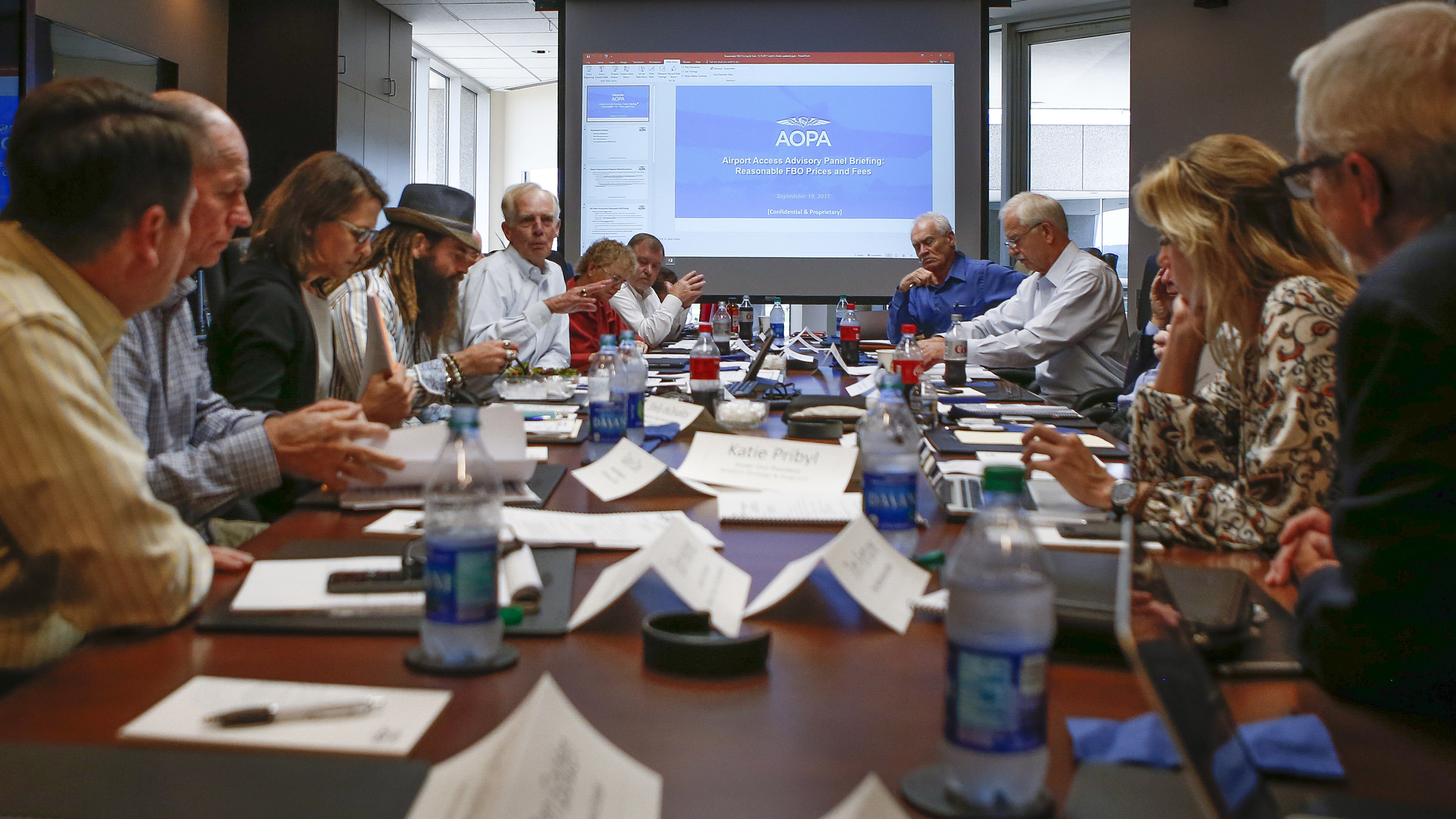AOPA forms Airport Access Advisory Panel
FBO, airport officials, industry experts meet to address egregious FBO pricing
A cross-section of the general aviation industry met at AOPA headquarters in Frederick, Maryland, Sept. 19 to discuss how to work with the FAA, elected officials, airport leaders, pilots, and fixed-base operators to develop policies that support access to airports as well as FBO transparency, pricing, and competition.
The meeting included current and former airport officials, industry experts, and numerous FBO owners and executives such as Jeff Baum, president of Wisconsin Aviation; Bill Borgsmiller, CEO of ACI Jet; Gary Cox, General Manager of Cox Aviation; Shelly deZevallos, president of West Houston Airport and member of the National Business Aviation Association’s board of directors; Matt Hagans, CEO of Montgomery Aviation; and Bob Wilson, CEO of Wilson Air. The panel started the day with staff briefings on recent efforts including AOPA’s recently filed Part 13 complaints.
AOPA General Counsel Ken Mead, who leads AOPA’s cross-departmental effort to research and fight unreasonable FBO fees, headed the meeting.
“This is really only about a number of places, mostly large FBOs with a monopoly position, where a particular set of circumstances have come together and resulted in egregious fees and pricing practices," Mead said. “That, combined with consolidation in the FBO industry, has pilots concerned about what the future might bring. We welcome this diverse and experienced group to advise AOPA on how we can work to empower airport boards, pilots, and elected officials to find the right balance between reasonable pricing for pilots and profitability for FBOs.”
Chairman of the AOPA Board of Trustees Bill Trimble, President and CEO Mark Baker, Senior Vice President of Government Affairs Jim Coon, and Senior Vice President of Media, Communications, and Outreach Tom Haines also participated in the meeting.
Baker thanked the panel for their commitment and work, saying, “This is an important step in our work, and this panel will give us the advice and insight pilots across America need to ensure reasonableness at these public airports.”
One panelist, Carl Hopkins, a member and former chairman of California's Santa Barbara Airport Commission, said his journey started with an email to Baker asking for help at his airport.
AOPA has received numerous complaints about fees and prices at Santa Barbara. Hopkins is shepherding a request for proposals for two FBO leaseholds through drafting and approval, and he hopes they will ensure transparency and reasonable fees in Santa Barbara for years to come.
The meeting came weeks after AOPA named the top five most-complained about FBOs in America and filed three FAA Part 13 complaints along with seven affected pilots at Illinois's Waukegan National Airport, North Carolina's Asheville Regional Airport, and Florida's Key West International Airport. The complaints received a number of local headlines and extensive coverage in aviation media.
And OK3 Air at Heber City Municipal Airport, among the most-complained about FBOs according to AOPA’s survey due to reports of high fuel prices and unreasonable fees, has been making waves.
The Heber City Council is planning to consider revisions to the airport’s minimum standards, which AOPA believes will help facilitate competition over the provision of fuel services. On behalf of AOPA, Mead has sent two letters to the city recommending they adopt the revised standards.
OK3 Air believes the city needs the FBO’s consent for revisions to minimum standards. So much so that it is threatening to sue the city if the changes are adopted.
In the past the owner of OK3 Air has said that making Heber City Airport a “cheap fuel” destination would result in an increase in traffic and noise.
Similarly, the latest letter from OK3 Air threatening legal action against the city cited “a difference between attracting more business and attracting good business.”
OK3 Air has also been busy on Twitter criticizing AOPA and specific members as well as Heber City’s efforts to revise minimum standards and make the airport friendlier to all segments of general aviation.
“More and more we are seeing airport boards and cities stand up,” Mead said, “and with the help of the Airport Access Advisory Panel, we will be even more effective in helping communities and pilots reclaim their airport.”




